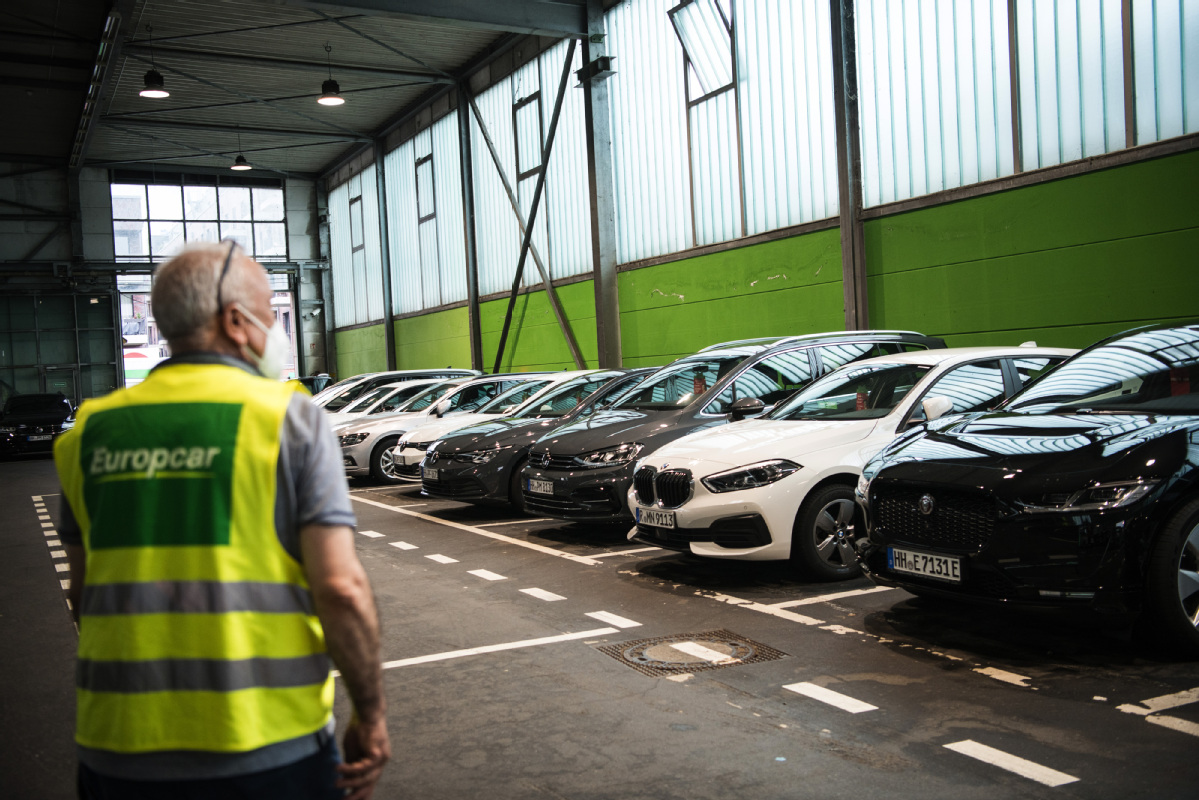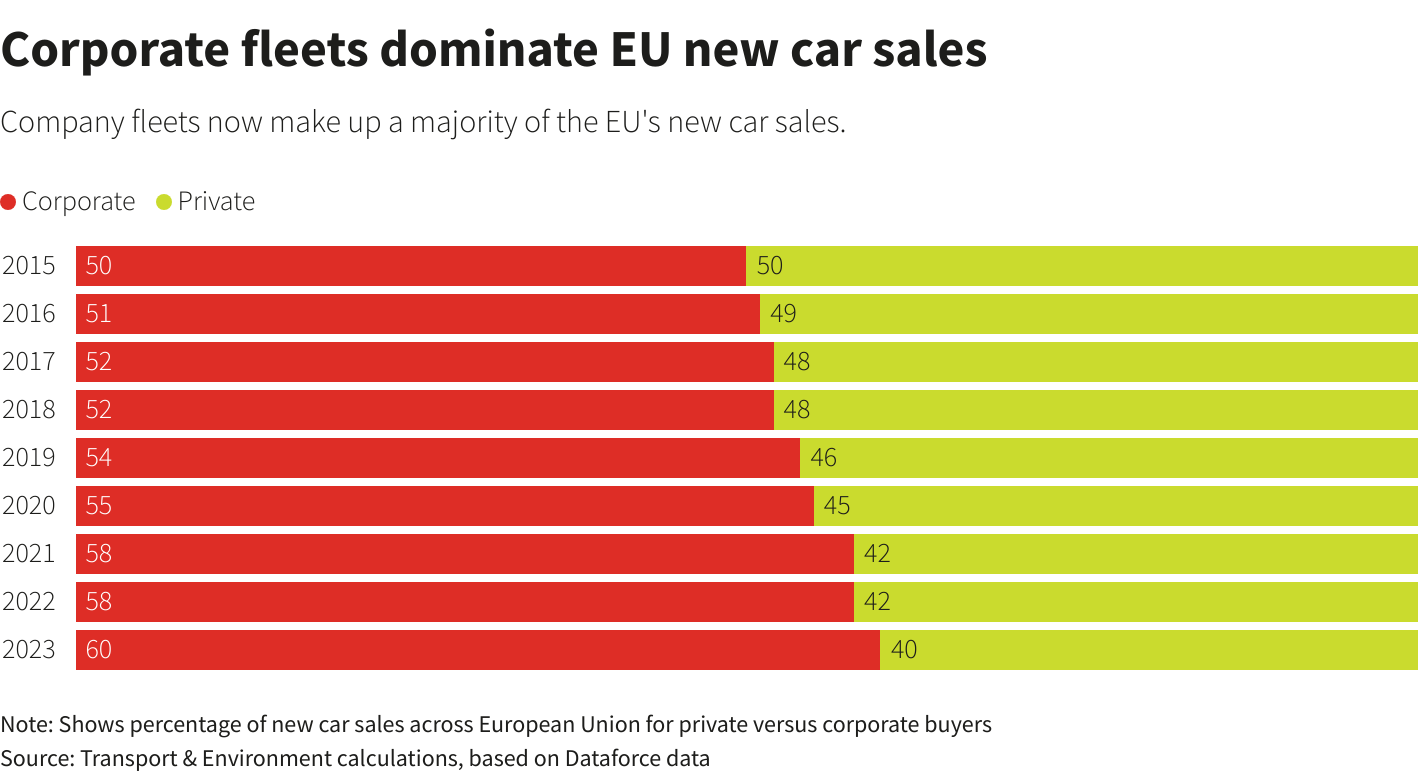
Rental cars at an automobile rental depot of Europcar Mobility Group in Hamburg, Germany, in 2021. STEFANIE LOOS/GETTY IMAGES
Low residual values for electric vehicles have pushed European leasing firms to raise prices and some are threatening to quit the business altogether if they are forced to go electric too fast, according to a report.
Different from the Chinese market, where individuals are the biggest buyers of vehicles, leasing companies play a pivotal role in Europe.
Up to 60 percent of new cars are leased in Europe, according to data from market research firm Data-Force. When it comes to EVs, the proportion is estimated to be as high as 80 percent.

The price of a lease is designed to account for the depreciation of a vehicle over the typical three-year lease period, based on estimated resale prices, or residual values.
But if secondhand prices end up being lower than anticipated when the lease ends, leasing firms take a financial hit when they get the vehicle back.
For various reasons — from Tesla's price cuts to concerns about charging infrastructure and battery life to the influx of more affordable Chinese EVs — secondhand electric car prices have been sliding in Europe since hitting a peak in October 2022.
According to data firm Autovista, resale values for EVs in Germany in early July were 24 percent below pre-pandemic levels and 30 percent lower in Britain.
"People have become more accepting of used EVs, but they've got to be cheap," said Gary Cambridge, a partner at used car dealer Cambridge Motors in London. "If they're expensive, people don't want them."
Leasing companies declined to give specific details about any losses on EV contracts from the slump in residual values. Signs have shown up in disclosures by some rental companies.
Bart Beckers, deputy CEO at Arval, the leasing company owned by French bank BNP Paribas, said losses from low EV resale values were currently limited in number, given EVs are only a small portion of their overall portfolio.
"But the amounts are not insignificant," he said. "Like other leaders in the market ... (Arval) has been forced to already increase prices because of lower residual values."
Like Ayvens, EVs only make up about 10 percent of Arval's fleet of 1.7 million vehicles.
In Germany, Europe's biggest auto market, data from German think tank CAR (Center Automotive Research) show that EV leases have jumped in the last three years.
In August 2021, a lease for a 45,000 euro ($49,446) EV cost 284 euros per month, well below the 473 euros for an equivalent fossil-fuel model. Now, the cost for the EV has more than doubled to 621 euros while the fossil-fuel car has fallen slightly to 468 euros.
German EV sales fell 16.4 percent in the first half of 2024 after the government abruptly axed subsidies for consumers in December and that decline has hit the overall EU trend.
Sales of fully electric vehicles in the EU rose to 14.6 percent of new car sales in 2023 from 6.1 percent in 2020 but that slipped to 14.4 percent in the first half as EV sales rose a tepid 1.3 percent.
Tim Albertsen, CEO of Ayvens, one of Europe's largest auto leasing firms, said the company is now leasing EVs for longer than combustion-engine cars to reduce resale risks.
It has also started to lease EVs out once or twice more "at a more affordable rate" and keep them in its portfolio longer, possibly for up to eight years, he said.
Such is the concern about potential losses, RVI Group, a company based in Stamford in the US that offers insurance guaranteeing a specific residual value for an asset, opened an office in Europe last year to field coverage queries.
"The larger the share of EVs in their portfolios becomes, the bigger this problem is going to be," said Richard Knubben, director-general of Leaseurope, an umbrella body in Brussels that lobbies on behalf of car leasing and rental groups.
The European Commission's "greening corporate fleets" open public consultation, which included looking at possible measures to accelerate EV adoption, ended on July 8.
Brussels-based Transport & Environment wants the commission to mandate that Europe's large corporate fleets and leasing companies go 100 percent electric by 2030.
Stef Cornelis, director of Transport & Environment's electric fleets program, said forcing fleets to electrify would result in more used cars for consumers and speed up the EV transition.
Leaseurope said an EV mandate would significantly damage leasing companies and Arval's Beckers says that, at a minimum, it would have to raise future lease rates further.
"If we were pushed very, very hard, that everything has to be electric too soon ... my shareholders will say 'we don't want to take the risk' and we'd be out of the market," said Albertsen at Ayvens. "Let's be honest, without us, who will take the risk?"









